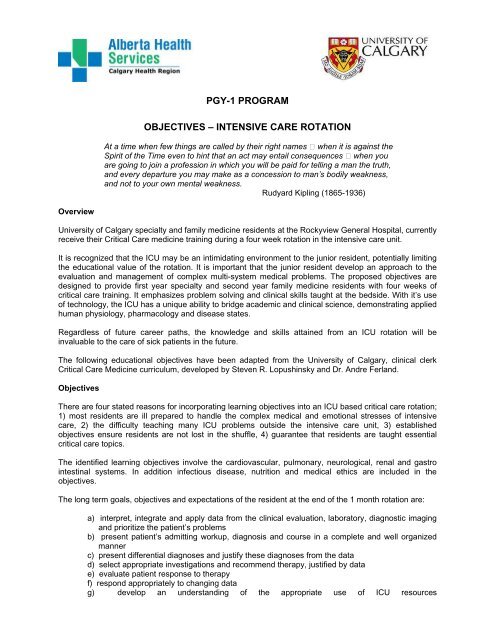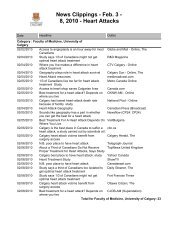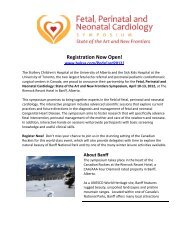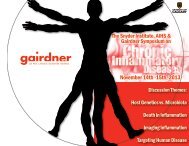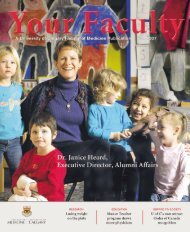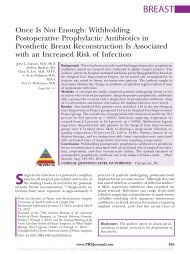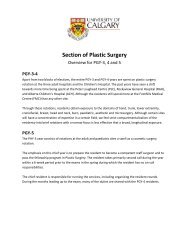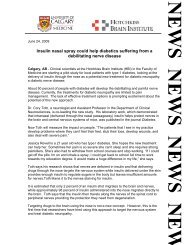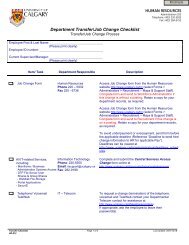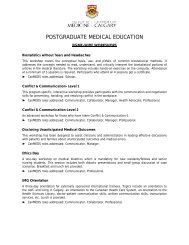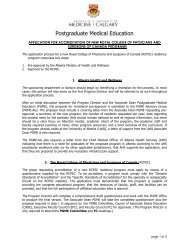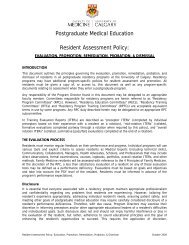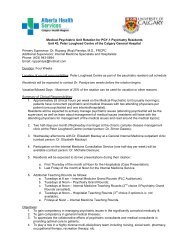pgy-1 program objectives â intensive care rotation - Faculty of ...
pgy-1 program objectives â intensive care rotation - Faculty of ...
pgy-1 program objectives â intensive care rotation - Faculty of ...
Create successful ePaper yourself
Turn your PDF publications into a flip-book with our unique Google optimized e-Paper software.
PGY-1 PROGRAM<br />
OBJECTIVES – INTENSIVE CARE ROTATION<br />
At a time when few things are called by their right names when it is against the<br />
Spirit <strong>of</strong> the Time even to hint that an act may entail consequences when you<br />
are going to join a pr<strong>of</strong>ession in which you will be paid for telling a man the truth,<br />
and every departure you may make as a concession to man’s bodily weakness,<br />
and not to your own mental weakness.<br />
Rudyard Kipling (1865-1936)<br />
Overview<br />
University <strong>of</strong> Calgary specialty and family medicine residents at the Rockyview General Hospital, currently<br />
receive their Critical Care medicine training during a four week <strong>rotation</strong> in the <strong>intensive</strong> <strong>care</strong> unit.<br />
It is recognized that the ICU may be an intimidating environment to the junior resident, potentially limiting<br />
the educational value <strong>of</strong> the <strong>rotation</strong>. It is important that the junior resident develop an approach to the<br />
evaluation and management <strong>of</strong> complex multi-system medical problems. The proposed <strong>objectives</strong> are<br />
designed to provide first year specialty and second year family medicine residents with four weeks <strong>of</strong><br />
critical <strong>care</strong> training. It emphasizes problem solving and clinical skills taught at the bedside. With it’s use<br />
<strong>of</strong> technology, the ICU has a unique ability to bridge academic and clinical science, demonstrating applied<br />
human physiology, pharmacology and disease states.<br />
Regardless <strong>of</strong> future <strong>care</strong>er paths, the knowledge and skills attained from an ICU <strong>rotation</strong> will be<br />
invaluable to the <strong>care</strong> <strong>of</strong> sick patients in the future.<br />
The following educational <strong>objectives</strong> have been adapted from the University <strong>of</strong> Calgary, clinical clerk<br />
Critical Care Medicine curriculum, developed by Steven R. Lopushinsky and Dr. Andre Ferland.<br />
Objectives<br />
There are four stated reasons for incorporating learning <strong>objectives</strong> into an ICU based critical <strong>care</strong> <strong>rotation</strong>;<br />
1) most residents are ill prepared to handle the complex medical and emotional stresses <strong>of</strong> <strong>intensive</strong><br />
<strong>care</strong>, 2) the difficulty teaching many ICU problems outside the <strong>intensive</strong> <strong>care</strong> unit, 3) established<br />
<strong>objectives</strong> ensure residents are not lost in the shuffle, 4) guarantee that residents are taught essential<br />
critical <strong>care</strong> topics.<br />
The identified learning <strong>objectives</strong> involve the cardiovascular, pulmonary, neurological, renal and gastro<br />
intestinal systems. In addition infectious disease, nutrition and medical ethics are included in the<br />
<strong>objectives</strong>.<br />
The long term goals, <strong>objectives</strong> and expectations <strong>of</strong> the resident at the end <strong>of</strong> the 1 month <strong>rotation</strong> are:<br />
a) interpret, integrate and apply data from the clinical evaluation, laboratory, diagnostic imaging<br />
and prioritize the patient’s problems<br />
b) present patient’s admitting workup, diagnosis and course in a complete and well organized<br />
manner<br />
c) present differential diagnoses and justify these diagnoses from the data<br />
d) select appropriate investigations and recommend therapy, justified by data<br />
e) evaluate patient response to therapy<br />
f) respond appropriately to changing data<br />
g) develop an understanding <strong>of</strong> the appropriate use <strong>of</strong> ICU resources
h) explain the ethical issues and <strong>of</strong>fer solutions to ethical problems involving patients in the<br />
<strong>intensive</strong> <strong>care</strong> unit<br />
i) critically appraise literature<br />
The short term <strong>objectives</strong> are identified to serve as a daily guide to rounds and patient <strong>care</strong>, to ensure<br />
long term educational <strong>objectives</strong> are met.<br />
Core knowledge, skills and learning <strong>objectives</strong> for a resident during the 1-month critical <strong>care</strong> medicine<br />
<strong>rotation</strong> include:<br />
1. Respiratory Disease<br />
a) Applied physiology<br />
b) Normal arterial blood gases<br />
c) Differential diagnosis and diagnostic approach to respiratory distress, acute hypoxemia, and<br />
hypercarbia<br />
d) Management <strong>of</strong> respiratory distress (i.e. acute pulmonary embolism, upper airway obstruction,<br />
status asthmaticus, pneumonia and ARDS)<br />
e) Indications for intubation and mechanical ventilation<br />
2. Cardiovascular Disease<br />
a) Applied cardiopulmonary physiology<br />
Determinants <strong>of</strong> cardiac output and the principles <strong>of</strong> oxygen delivery<br />
Determinants <strong>of</strong> myocardial oxygen consumption<br />
Understanding <strong>of</strong> preload, after load, and contractility<br />
Role <strong>of</strong> vasopressors and inotropes<br />
b) Hypotension<br />
Differential diagnosis <strong>of</strong> circulatory shock (cardiogenic, hypovolemic, obstructive, and<br />
distributive)<br />
Diagnostic plan and management<br />
c) Arrhythmias<br />
Recognition and management <strong>of</strong> supraventricular and ventricular arrhythmias, including<br />
assessment <strong>of</strong> precipitating cause<br />
d) Myocardial infarction<br />
Recognition and initiate therapy for acute MI and identify potential complications<br />
3. Neurology<br />
a) Applied physiology<br />
b) Altered mental status, status epilepticus, stroke syndromes<br />
4. Renal<br />
a) Applied renal, fluid and electrolyte physiology<br />
b) Acute renal failure and/or oliguria<br />
Differential diagnosis, diagnostic approach, and management<br />
c) Indications for emergency dialysis<br />
d) Acid-base and common electrolyte disturbancesDifferential diagnosis, diagnostic approach,<br />
and management<br />
5. Gastrointestinal<br />
a) Applied gastrointestinal and hepatic physiology<br />
b) Acute abdomen<br />
Differential diagnosis, diagnostic approach and management<br />
c) Gastrointestinal hemorrhage<br />
Differential diagnosis, diagnostic approach and management<br />
Indications for endoscopy<br />
d) Liver Dysfunction<br />
Hepatic encephalopathy: Differential diagnosis, diagnostic approach and management
6. Hematological Disease<br />
a) Applied hematological physiology<br />
b) Coagulopathy<br />
Differential diagnosis, diagnostic approach and management<br />
c) Anemia<br />
Indications for blood and plasma products<br />
7. Infectious Disease<br />
a) Applied physiology and microbiology <strong>of</strong> common infections in the ICU.<br />
b) Fever<br />
Differential diagnosis, diagnostic approach and management<br />
c) Nosocomial pneumonia and catheter-related infections<br />
d) Appropriate antibiotic selection<br />
8. Metabolic/Nutrition<br />
a) Principles <strong>of</strong> nutrition: enteral and parenteral<br />
b) Evaluation <strong>of</strong> nutritional status and how this differs in the critically ill patient<br />
c) Disorders <strong>of</strong> sodium or glucose imbalance<br />
9. Pain and Psychosocial<br />
a) Principles and pharmacology <strong>of</strong> sedation, anxiety and pain management<br />
b) Recognize and manage the psychosocial aspects in the <strong>care</strong> <strong>of</strong> patients and families<br />
during acute catastrophic illnesses.<br />
10. Ethical decision making<br />
a) Principles <strong>of</strong> patient autonomy and informed consent<br />
b)..Purpose <strong>of</strong> Advanced directives and goals <strong>of</strong> <strong>care</strong><br />
c) Principles <strong>of</strong> withholding and withdrawing therapy<br />
d) End <strong>of</strong> life discussion<br />
11. Procedure <strong>objectives</strong><br />
Develop basic competence in:<br />
a) Central venous access: internal jugular, subclavian, femoral veins<br />
b) Endotracheal intubation<br />
c) Arterial line insertion: radial artery, femoral artery<br />
d) Chest tube insertion<br />
e) Electrical cardio version<br />
Program Description<br />
Clinical Activities<br />
The rotating resident is expected to attend daily ICU rounds prepared to present their own patients and to<br />
participate in the discussion <strong>of</strong> all patients. Discussion should include prioritizing the patient’s problems,<br />
differential diagnoses, therapeutic recommendations and investigations. Each day rounds will include<br />
diagnostic imaging. During the <strong>rotation</strong>, residents should come to recognize common and life-threatening<br />
x-ray findings. Following rounds, the student is expected to carry out the patient <strong>care</strong> plan as agreed upon<br />
by the multi-disciplinary team.<br />
Should a patient require any invasive procedures, these may be done only at the discretion and under the<br />
guidance <strong>of</strong> more senior team members. Procedures will be performed independently only after<br />
demonstrating the necessary competence to a CCM resident or faculty.<br />
Formal Educational Activities<br />
In addition to the direct one-to-one teaching by faculty and critical <strong>care</strong> residents on daily bedside rounds<br />
and in the evaluation <strong>of</strong> new patients admitted to the ICU, rotating residents will also be exposed to<br />
several formal educational activities:
a) Bedside Rounds<br />
Occur daily at 1000-1200h and 1700h<br />
b) Residents are expected to attend didactic Teaching Sessions, which occur every Monday<br />
and Friday from 0800-0900h via teleconferencing in the ICU classroom. This lecture series<br />
repeats on an 8-week <strong>rotation</strong><br />
c) ICU Crash Course<br />
The first day <strong>of</strong> each 4 week block includes the ICU Crash Course which is held in the PLC<br />
ICU Classroom. This course is mandatory and you are to attend this at the start <strong>of</strong> or before<br />
your ICU <strong>rotation</strong>.<br />
d) ICU Grand Rounds<br />
Occur every Wednesday from 0830-0930h via teleconferencing in the ICU classroom.<br />
These rounds are considered mandatory even though rotating residents are not the primary<br />
target audience.<br />
An ICU pocket handbook is available to you on loan for the duration <strong>of</strong> the <strong>rotation</strong>. These can be<br />
picked up at the ICU Administration at the beginning <strong>of</strong> your <strong>rotation</strong>. A $20.00 deposit is required which<br />
is refunded when the item is returned at the end <strong>of</strong> the <strong>rotation</strong>. Please see Joan Emery who can be<br />
reached at 943-3788.<br />
Responsibilities:<br />
The rotating residents will be given graded responsibility in relation to their core knowledge, cognitive and<br />
technical ability. It is presumed that the resident will be capable <strong>of</strong> caring for 2 to 3 patients daily. Critical<br />
<strong>care</strong> residents, fellows and <strong>intensive</strong> <strong>care</strong> staff will guide diagnostic and therapeutic goals. Call duties<br />
may include responsibilities within the <strong>intensive</strong> <strong>care</strong> unit, emergency room or ward as deemed<br />
appropriate by the ICU attending.<br />
The resident’s daily responsibilities include:<br />
a) Being the patient’s primary <strong>care</strong> physician.<br />
b) Admitting patients to the Intensive Care Unit after an appropriate history and physical<br />
examination has been performed and discussed with the ICU attending physician on-call. All new<br />
admissions will have a set <strong>of</strong> ICU admission orders entered in SCM.<br />
c) Completing consults directed to the ICU.<br />
d) Attending rounds every morning with the ICU team unless post-call. Providing ongoing <strong>care</strong> and<br />
management <strong>of</strong> the patient including, performing a pertinent physical examination daily.<br />
e) Writing a progress note with an emphasis on the patient’s problems, planned treatment and daily<br />
goals <strong>of</strong> therapy. For post-call residents this must be done prior to the 0800 hr handover.<br />
f) Reviewing laboratory tests each day and signing <strong>of</strong>f laboratory results. Anticipating the patient’s<br />
need for future blood work and x-rays and entering the orders in SCM. “Daily” orders may be<br />
written on patients while they are critically ill, but, must be reassessed on a daily basis.<br />
g) Physician to physician notification when transferring patients out <strong>of</strong> the ICU. The nurse clinician<br />
will be informed once this has taken place.<br />
h) Dictating discharge/transfer summaries on all patients leaving the ICU. Revising the patient’s<br />
orders will be prior to transfer.<br />
i) Taking part in the call schedule.<br />
j) Taking part in family meetings.
k) Assisting the cardiac arrest (Code Blue) team leader. The attending physician on-call will act as a<br />
resource person.<br />
l) Assisting the Code 66 team leader. This team is designed to assess and initiate management for<br />
unstable ward patients that may or may not require ICU admission.<br />
Guidelines for a resident’s daily responsibilities:<br />
0800 hours Resident(s) to see and evaluate patients, including a pertinent physical examination<br />
and review <strong>of</strong> investigations<br />
The post-call resident will verbally hand over <strong>care</strong> <strong>of</strong> their patient(s) to the resident(s)<br />
remaining that day. The post-call resident will have seen and examined their patient(s)<br />
and have written a daily progress note with an emphasis on the plans and goals for their<br />
patient(s) prior to the handover <strong>of</strong> <strong>care</strong>, to ensure continuity <strong>of</strong> <strong>care</strong><br />
1000 hours ICU Bedside Rounds<br />
All residents, who are not post-call, will attend these rounds, which are designed to<br />
review in detail the patients. These rounds are to provide individual teaching in the<br />
Oslerian tradition surrounding the patient’s day-to-day management. They will include<br />
discussion <strong>of</strong> principles <strong>of</strong> assessment and diagnosis, underlying physiology and the<br />
basis <strong>of</strong> treatment <strong>of</strong> patients.<br />
These rounds involve a multidisciplinary team including nursing, respiratory therapy,<br />
physiotherapy, pharmacy, dietary, and social work.<br />
1700 hours Evening bedside Rounds<br />
Residents, who are not post-call, will attend these rounds, which are designed to followup<br />
on the plans and daily goals defined in morning rounds, review results <strong>of</strong> new<br />
investigations or new problems arising during the day. The <strong>care</strong> and goals for the patient<br />
during the night will be determined and handed over to the resident or bedside extender<br />
on call.<br />
2200 hours Bedside Rounds<br />
A bedtime round by the on-call resident is expected and is used to review the patients’<br />
condition and which therapeutic goals have been met. Goals and plans will be adjusted<br />
as needed for management through the rest <strong>of</strong> the night.<br />
Evaluations<br />
Rotating resident evaluations based on the <strong>rotation</strong> <strong>objectives</strong> and responsibilities occurs at the end <strong>of</strong><br />
every <strong>rotation</strong> as per the standard In Training Evaluation Report (ITER). This evaluation will include input<br />
from all attending physicians, fellows, and nursing unit supervisors with whom the rotating resident has<br />
worked. Personnel feedback prior to the final evaluation can be sought by the resident.<br />
Residents may receive an interim evaluation after two weeks to ensure appropriate measures are taken<br />
to correct major weaknesses. .<br />
Call schedules<br />
The ICU call schedule is generally finalized one month in advance. This is necessary because <strong>of</strong> the use<br />
for bedside physicians in the ICU and the need to schedule them well in advance.<br />
If you have any specific requests for time <strong>of</strong>f, these must be made no later than three months in advance<br />
<strong>of</strong> your <strong>rotation</strong>. They should be forwarded to the RGH ICU Administration Offices (943-3788).<br />
Time <strong>of</strong>f requests will be weighed on an individual basis taking into account the need to ensure patient<br />
safety and proper function <strong>of</strong> the unit. Requests for time <strong>of</strong>f during the first week <strong>of</strong> the <strong>rotation</strong> will only<br />
be granted a highly selective basis, as all ICU orientation activities take place during that week.
We respect the 24-hour on-call rule and you will be relieved <strong>of</strong> clinical decision-making responsibilities at<br />
0800h <strong>of</strong> your post-call day. However, you will still be expected to attend teaching sessions and complete<br />
your non-clinical responsibilities.<br />
IDEAS to help the <strong>intensive</strong> <strong>care</strong> unit to run smoothly (or, how to survive an <strong>intensive</strong> <strong>care</strong><br />
<strong>rotation</strong>)<br />
1. Please enter all orders, including emergent orders, in SCM.<br />
2. Please enter orders for initial and subsequent ventilator settings. Specific orders are<br />
required for weaning.<br />
3. When ordering antibiotics or other drugs used for a limited duration, please, specify the<br />
duration <strong>of</strong> therapy or a stop date in the initial orders. Include, when appropriate, orders<br />
for sedation breaks.<br />
4. Plan ahead. Order x-rays and the laboratory investigations that will be required for the<br />
following day, on evening rounds. Order drug levels, when appropriate, as you order the<br />
drug.<br />
5. Plan ahead, when possible, one day prior to a discharge.<br />
6. IF IN DOUBT, ASK. We know you are not equipped on arrival with the knowledge and<br />
skills you will need for this <strong>rotation</strong>. We are here to teach and help you.<br />
7. WE PROVIDE 24 HOUR COVERAGE


